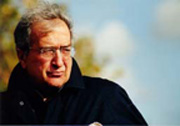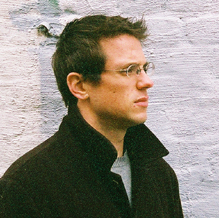 Wednesday, February 09, 2005
Wednesday, February 09, 2005
The virtue of virtuosity
Virtuosity fascinates me. It's interesting to trace the term through history and see how its meaning and the perception of virtuosity has changed.
 Virtuoso is an Italian word, which comes from the Latin, virtus, meaning excellence or worth. As currently used, the word refers to a performer who is especially adroit in the practice of his or her instrument, a musician of extraordinary technical skill. Originally, however, the word had much broader connotations, existing as a term of honor for people who distinguished themselves in an intellectual or artistic field. One could be deemed a virtuoso poet, a virtuoso architect, or a virtuoso scholar, for example. But the epithet was most likely to be applied to an excellent musician. Implicit in the concept of the virtuoso was not only unmatched technical skill, but recognition of a deeper understanding of the art. The term was used notably to indicate those who committed themselves to the theory or to the composition of music. Virtuoso is an Italian word, which comes from the Latin, virtus, meaning excellence or worth. As currently used, the word refers to a performer who is especially adroit in the practice of his or her instrument, a musician of extraordinary technical skill. Originally, however, the word had much broader connotations, existing as a term of honor for people who distinguished themselves in an intellectual or artistic field. One could be deemed a virtuoso poet, a virtuoso architect, or a virtuoso scholar, for example. But the epithet was most likely to be applied to an excellent musician. Implicit in the concept of the virtuoso was not only unmatched technical skill, but recognition of a deeper understanding of the art. The term was used notably to indicate those who committed themselves to the theory or to the composition of music.
Some people love virtuosity. Some hate it. Some think it's an integral component of music and progress and some find it detrimental to music. The whole enterprise can be so contentious. In my opinion, Luciano Berio (1925-2003) had the best view of virtuosity:
The best solo performers of our own time--modern in intelligence, sensibility, and technique--are those who are capable of acting within a wide historical perspective, and of resolving the tensions getween the creative demands of past and present, emplying their instruments as means of research and expression. Their virtuosity is not confined to manual dexterity nor to philological specialization. Although they may operate at differing levels of understanding, they are able to commit themselves to the only type of virtuosity that is acceptable today, that of sensibility and intelligence.
posted by Brian Sacawa
1:47 AM
|
|
 Praised by The New York Times as "an inventive musician . . . fresh and surprising," saxophonist Brian Sacawa has firmly established himself as an important contemporary voice for his instrument. He is active as a soloist, recitalist, and chamber musician throughout the United States and is the co-founder of the new music duo Non-Zero with percussionist Timothy Feeney.
Praised by The New York Times as "an inventive musician . . . fresh and surprising," saxophonist Brian Sacawa has firmly established himself as an important contemporary voice for his instrument. He is active as a soloist, recitalist, and chamber musician throughout the United States and is the co-founder of the new music duo Non-Zero with percussionist Timothy Feeney.
He has given premieres of over thirty works by both established and emerging composers, including Michael Gordon, Bright Sheng, Andrew Mead, Oliver Schneller, Ken Ueno, Beata Moon, Hillary Zipper, and Scott McAllister, among many others. Named the Baltimore CITYPAPER’s Critic’s Choice for Classical Music in 2002, he is the recipient of awards for solo performance from both national and international competitions.
Sacawa's versatile career has led to appearances with the St. Petersburg Philharmonic, the Detroit Symphony Orchestra, the New World Symphony, Harvard Group for New Music, New Music Brandeis, Bargemusic, and at meetings of the ISU Contemporary Music Festival, World Saxophone Congress, North American Saxophone Alliance, and New England Saxophone Symposium.
Brian holds degrees from the University of Michigan, the Peabody Conservatory, and the University of Massachusetts – Amherst, where he studied with Donald Sinta, Gary Louie, and Lynn Klock. He has recorded for the Equililbrium, Naxos, and BiBimBop recording labels.
See Brian's other blog
Sounds Like Now
| |



